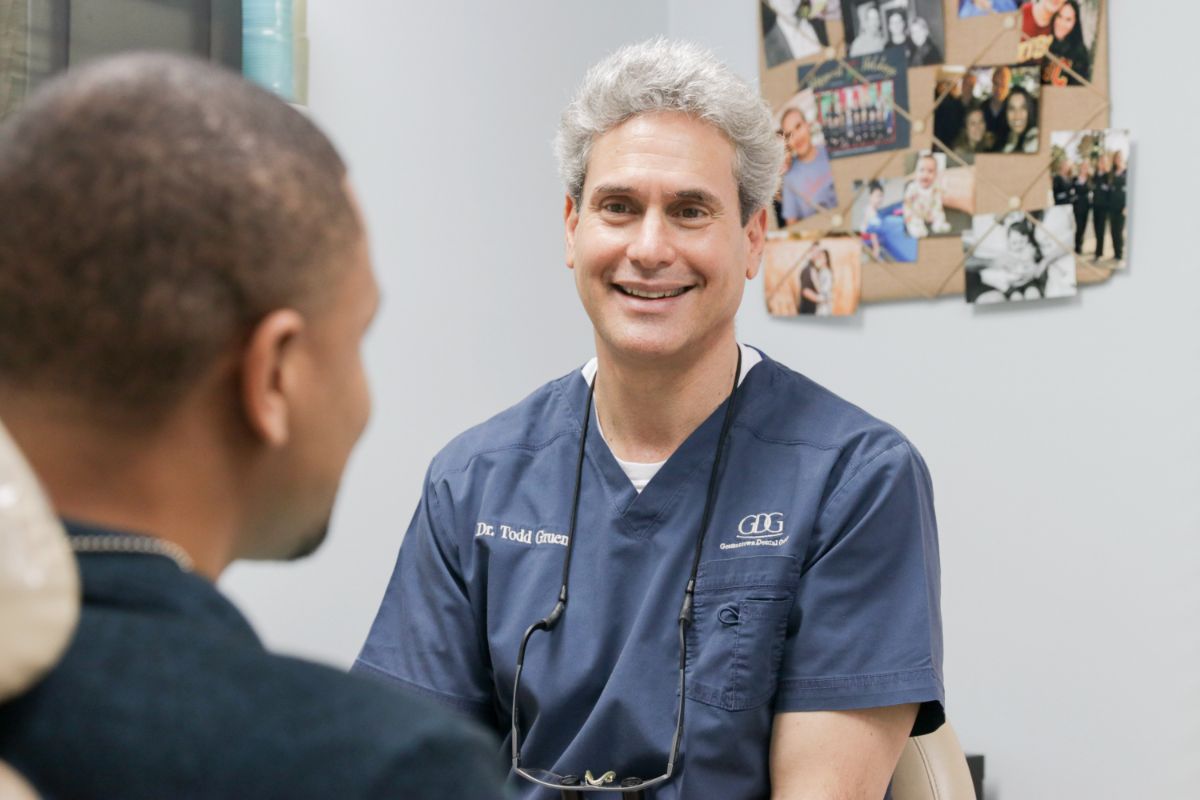It’s not unusual to occasionally catch yourself clenching your teeth, especially if you’re feeling frustrated or stressed out. This generally isn’t a problem, but if you’re waking up feeling unrested or experiencing soreness in your jaw, you could be one of the millions of Americans dealing with bruxism. That’s the technical term for teeth grinding, and experts estimate that up to 1 in 5 adults spend a significant part of every day grinding their teeth. Many aren’t even aware that they’re doing it! We’re here to tell you all about teeth grinding 101, the types, causes, and treatments.
As common as it is, teeth grinding is something we see a lot of here at Germantown Dental Group. Whether it happens throughout the day or shows up while you’re sleeping, bruxism can lead to many dental issues. Our expert team is dedicated to helping our patients achieve the healthiest smile possible, so let’s take a closer look at what bruxism is, the possible causes of it, and how we can help you resolve them! Keep reading below to learn more.
Let’s talk teeth grinding
Bruxism describes any involuntary grinding, clenching, or rubbing of the teeth outside of normal movements like chewing, swallowing, or speaking. When it occurs during the day, we refer to it as diurnal. If it happens at night, it is considered to be nocturnal. There are three basic types of teeth grinding. These may have different symptoms that require a different treatment approach.
Sleep bruxism
This is the most common type of teeth grinding we see. It occurs only (or mostly) during the hours a patient is asleep. If this is something you’ve experienced, it’s possible you aren’t even aware of it. Anyone nearby may have noticed it, however, and has probably been awakened by the sound of it once or twice!
Awake bruxism
This type of bruxism is a bit less common, but it’s often a little easier to identify and treat. We frequently see awake bruxism in patients who are prone to clenching or grinding their teeth when they’re under a lot of stress or feeling anxious about something.
Children’s bruxism
Some children experience an increase in bruxism when their baby teeth come in, and again when their permanent teeth begin erupting. Many of them outgrow this habit by their teens or early adulthood. If it continues beyond that, treatment may become necessary at some point.

What causes teeth grinding?
Although we don’t fully understand the exact reasons for developing bruxism, it’s linked to both physical and psychological causes. There is likely a genetic component in some cases, as well. These include the following.
Sleep disorders
Sleep disorders are a big risk factor for teeth grinding. In fact, they’re one of the most common issues associated with bruxism, especially obstructive sleep apnea (OSA.) Teeth grinding often happens after an OSA episode as part of a survival mechanism to open the airway; almost a quarter of all people with OSA also experience sleep bruxism. Other sleep-related disorders that have a connection to teeth grinding include gastroesophageal reflux disease (GERD), chronic snoring, and sleep talking.
Stress and anxiety
As we’ve mentioned, anxiety and stress are two of the biggest contributors to teeth grinding. Whether you’re experiencing external stressors that have caused a noticeable increase in your teeth grinding, or are just a naturally anxious person, it can help to explore various methods of stress relief. These might include deep breathing, calming music, meditation, taking a long walk outside, or reading a good book before bed.
Malocclusions
Although we tend to see this in children more than adults, patients of any age can have a bad bite that may lead to teeth grinding. Drs. Gruen and Whittemore are dental specialists trained to identify orthodontic issues like these and recommend the appropriate treatment for them. Some misalignments can even be treated here in our Germantown office using the Six Month Smiles and Invisalign systems!
Medications, medical conditions, and genetics
There are certain medications and medical conditions for which bruxism can be a side effect. This is especially true of neurological conditions. Teeth grinding can also be inherited. If others in your family have ever experienced bruxism, you’re more likely to develop it as well.
What are the symptoms and side effects of teeth grinding?
While bruxism is not necessarily a serious disorder, it can still have a negative effect on your oral health and overall well-being. Some of the difficulties you may experience in conjunction with chronic teeth grinding include the following.
Damaged tooth enamel
Tooth enamel is the hardest substance in our bodies, but grinding your teeth over time can wear it down significantly. In some cases, it can be worn through completely, exposing the soft inner core of the tooth. This is called the dentin, and it’s where the nerve endings are located. Because dentin is much softer than enamel, your teeth will wear down much more rapidly once it’s been exposed.
Interrupted sleep
Bruxism is actually classified as a sleep disorder. It often disrupts restful sleep, and waking up multiple times a night can be hard on your body, brain, and emotions! Whatever the underlying cause of your bruxism, you may wake up after a night of teeth grinding feeling unrested with soreness in your jaw or face.
Aches and pains
Patients who experience prolonged teeth grinding may find themselves dealing with a long list of possible symptoms. These may include:
- chipped or loose teeth
- teeth that have a “flattened” appearance
- tooth pain
- increased sensitivity
- jaw muscles that feel tired or tight
- trouble opening or closing your jaw completely
- pain or soreness in your face, neck, or jaw
- pain similar to an earache
- headaches
Experiencing one or more of these issues can take a toll on your oral health. It can also negatively impact your overall quality of life if left untreated.

Beat bruxism with help from Germantown Dental Group
If you’ve been dealing with the side effects of bruxism, we encourage you to contact our experienced team here at Germantown Dental Group. We’ll be able to help you reduce the amount of grinding and prevent any further damage. Our doctors can also address any damage that is already present.
If you’re in the Mid-South area and struggling to have a productive day or get a good night’s sleep due to teeth grinding, our expert team can help. Dr. Gruen and Dr. Whittemore have years of experience treating a wide variety of issues, so you know you’re putting your dental care in the best hands. Get in touch with us today to schedule a consultation and find relief for your smile!
 Schedule Now
901-754-0540
Schedule Now
901-754-0540
